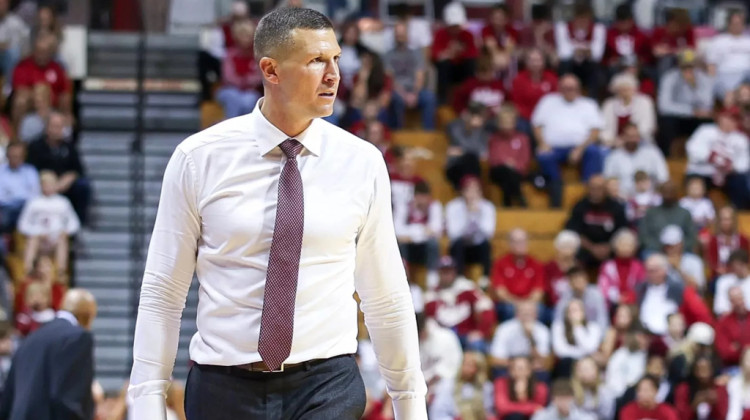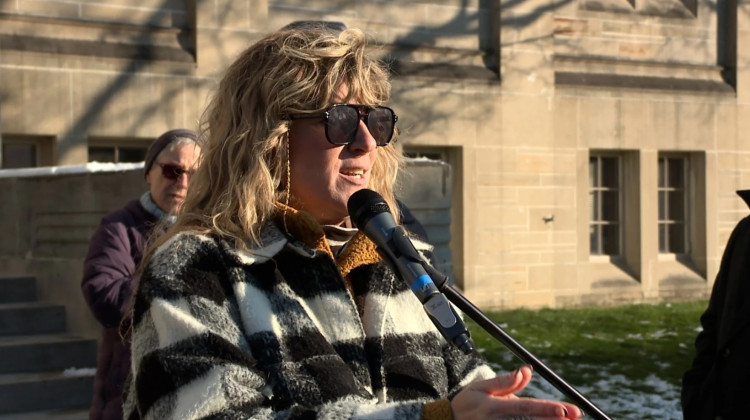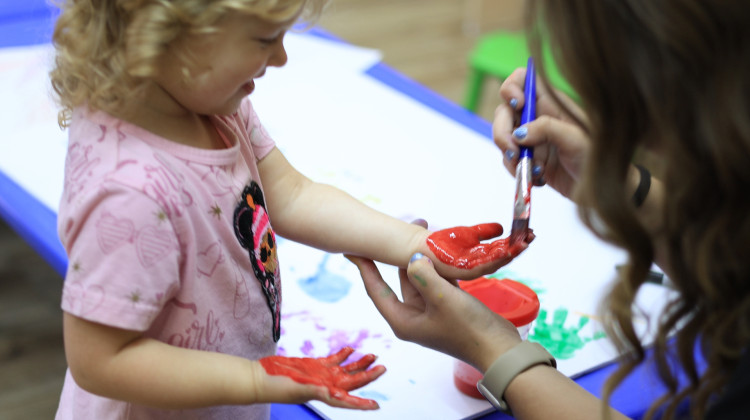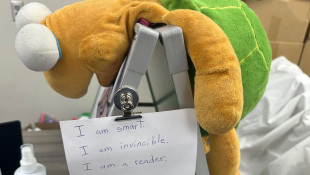
Second-grade teacher Morgan O'Dell holds her fingers to her throat to show her students how to feel whether they are using their vocal cords at Thomas Miller Elementary School in Lafayette on Tuesday, Dec. 4, 2023.
Dylan Peers McCoy/WFYIOn a recent Tuesday morning, Morgan O'Dell showed her second-grade class a new skill: how to tell if the sounds that letters and words make are voiced or unvoiced.
“Put your forefingers right here on the front of your throat,” O’Dell told a semi-circle of students on the floor. “When you're talking, sometimes your voice vibrates.”
With their hands on their throats, 17 kids said their names slowly, stretching out the syllables.
“If you can feel your throat vibrating, that means you're using your vocal cords to make sounds,” O’Dell said.
This lesson is also new for O’Dell, who has taught for about seven years. The Lafayette school system where O’Dell works is overhauling reading instruction. In prior years, O’Dell said that her students have spent a lot of time on drills to help them memorize common words. But this year, their focus is on learning the sounds letters make and how to decode words.
“We’re really helping them understand these sounds and these phonics skills,” she added.

The change in Lafayette was spurred by state policy. The Indiana legislature passed a bipartisan law that requires districts to use reading curriculums that follow the science of reading beginning next school year. The mandate was in response to an ongoing decline in literacy among young students across the state. Nearly 1 in 5 students were not mastering reading fundamentals like comprehension and phonics.
Business and philanthropic leaders also pushed lawmakers to take action by providing tens of millions in funds. This school year, the state awarded nearly $15 million in grants to help school districts make the transition , including about $433,000 for the Lafayette School Corporation .
Experts say that changing reading instruction is crucial to improving literacy because popular teaching strategies don’t match up with what scientists have learned about how people actually learn to read.
Purdue University professor Catherine McBride is a psychologist who studies reading and disabilities like dyslexia. She said that research shows that understanding how to pronounce words helps children learn to read and write.
“The more we know about specific aspects of speech, and speech sounds, the better able we are to read,” McBride said.
People need several skills to comprehend text, McBride said. People need to know vocabulary and understand sentence structure. They also need the background knowledge to make sense of what they read.
“But if you can't recognize the words on the page,” McBride said, “you can't get to the rest because you're just not going to be able to read at all.”
Reporter Emily Hanford’s coverage of the research into how people learn to read and why schools have relied on discredited methods has helped draw national attention to the science of reading. It inspired policy changes, including in Indiana .
A new law, HEA 1558 , requires Indiana schools to use literacy curriculums that follow the science of reading beginning next school year. It also prohibits educators from using three-cueing, a popular approach that encourages children to guess words based on clues like context and pictures.
But experts say for transformation to take hold in classrooms, educators must also be committed.

In Lafayette, that’s starting to happen. When assistant superintendent Alicia Clevenger heard about Indiana’s new curriculum requirements, she started researching the science of reading. She listened to Hanford’s podcast “Sold a Story.” And she realized that Lafayette schools needed to change.
“Many schools, including many teachers in our schools, were using what we call balanced literacy,” said Clevenger, referring to a widely used model of reading instruction that includes cueing.
“What the research is showing — based on science of reading — that all students need explicit instruction in phonemic awareness, phonics, fluency, vocabulary and comprehension,” Clevener said. “We had pieces of that explicit phonics instruction, but not everything.”
The Lafayette schools are rolling out a new reading curriculum, and they are working with an outside expert to teach administrators and educators about the science of reading. That training began online, but with the help of state grant funding, Lafayette will also have in-person coaching.
At first, some educators dismissed the push to follow the science of reading, Clevenger said.
“Some are like, you know, ‘this is a trend, it'll come and go again,’ ” Clevenger said. “But I don't think this is going anywhere because of legislation. But more importantly, it's best practice.”
Clevenger said some teachers who were skeptical at first have changed their minds as they see the new strategies work for other educators.
Teaching reading is one of the most important parts of Morgan O'Dell’s work. But it used to be her least favorite subject. “The kids would get so frustrated and down on themselves,” she said.
When Lafayette started using the new curriculum, she was nervous at first. About a semester in, however, she’s convinced it is helping her students.
“I have kids that are all sorts of levels,” O’Dell said. “I don't have a kiddo that it's not working for.”
Contact WFYI education reporter Dylan Peers McCoy at dmccoy@wfyi.org.
 DONATE
DONATE






 View More Articles
View More Articles



 Support WFYI. We can't do it without you.
Support WFYI. We can't do it without you.